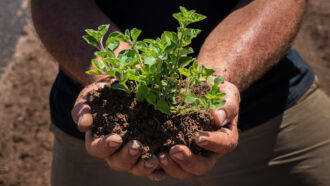GRIFFIN, Georgia – The Southern Sustainable Agriculture Research and Education (SSARE) program is adding a new military Veteran member seat to its Administrative Council, the governing body for the program in the Southern region.
SARE is a USDA-funded program that provides both research grant funding opportunities and educational resources for farmers/ranchers, ag professionals and other stakeholders in the community to further sustainable agriculture production and marketing principles and practices.
The Southern SARE program gives ag professionals and farmers/ranchers the opportunity to serve on the Administrative Council (AC) and provide a “voice” for the direction of sustainability across the Southern region. Administrative Council, or simply AC, guides the vision of the SARE program, setting goals related to sustainable agriculture, overseeing the review of grant Calls for Proposals, evaluating projects, and being ambassadors for the program.
The Veteran Member is a Veteran farmer representative with emphasis on the intersectionality of military service, farming, and physical and mental health and wellbeing. This AC representative will help liaise with any new and beginning farmer veterans working in sustainable agriculture, whether it be on-farms, in non-profit organizations, educational institutions, or in other areas.
USDA defines Veteran Farmer or Rancher as a "producer who served in the United States Army, Navy, Marine Corps, Air Force, or Coast Guard, including the reserve component thereof; was released from service under conditions other than dishonorable."
Southern SARE is inviting nominations from qualified individuals to fill this new seat. Nominations from all 13 states in the southern region, Puerto Rico and the US Virgin Islands will be considered.
The term will begin February 2025. The selected member will serve on the AC for a three-year term with opportunities for a second renewal term.
Application deadline (either to apply or to nominate an individual) is July 1, 2024. The application is available through this Google Form.
Criteria for Administrative Council appointment include the following:
Be a Military veteran;
Be a full-time farmer as a primary occupation; or
Be part-time farmer;
Have at least $1,000 of documented annual income from the operation;
Proven experience working with Veteran farmers in areas of sustainable agriculture;
Demonstrated ability and willingness to help address sustainable agriculture needs and methods; and
Ability to work effectively as a member of a team dealing with contemporary issues facing agriculture.
All AC members are members of standing committees, which may meet or communicate through conference calls to decide policy issues related to SSARE. The Administrative Council depends on outstanding nominees that you and your colleagues from across the region may put forward. We strongly encourage you to invest the effort required to advance good nominees.
Duties of the AC include attending AC meetings twice a year in February and August, generally 3-4 days for each meeting, including travel. Producer, self-employed, and NGO members are compensated for travel, lodging, meal expenses, and meeting time as they discharge their duties. Duties also include a commitment of time for reviewing grant proposals during the winter months ahead of the February AC meetings. Learn more about our Regional Leadership.
Council membership will be balanced with respect to diversity, equity, and inclusion.
The Administrative Council is made up of a cross-section farmers/ranchers, researchers, educators and ag professionals across the Southern region. Current membership stands at 26 representatives.
Learn more about Southern SARE at https://www.southern.sare.org.
For questions, contact Candace Pollock-Moore at cpollock@uga.edu
--30--
Published by the Southern Region of the Sustainable Agriculture Research and Education (SARE) program. Funded by the USDA National Institute of Food and Agriculture (NIFA), Southern SARE operates under cooperative agreements with the University of Georgia, Fort Valley State University, and the Kerr Center for Sustainable Agriculture to offer competitive grants to advance sustainable agriculture in America's Southern region. This material is based upon work that is supported by the National Institute of Food and Agriculture, U.S. Department of Agriculture, through Southern Sustainable Agriculture Research and Education. USDA is an equal opportunity employer and service provider. Any opinions, findings, conclusions, or recommendations expressed in this publication are those of the author(s) and do not necessarily reflect the view of the U.S. Department of Agriculture.
